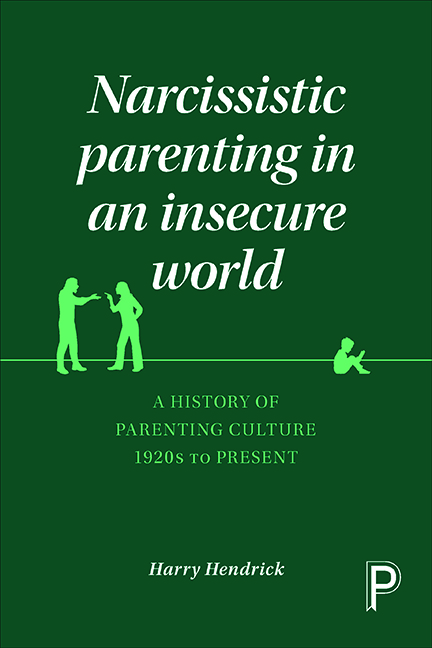Book contents
- Frontmatter
- Dedication
- Contents
- About the author
- Acknowledgements
- Introduction
- Part One The origins of social democracy’s family ideal: 1920s–1940s
- Part Two Characteristics of the ‘Golden Age’: 1940s–early 1970s
- Part Three Influences and examples from the USA
- Part Four Parental narcissism in neoliberal times: 1970s to the present
- Part Five Therapeutic reflections
- Index
seven - Laying the foundations for parental narcissism
Published online by Cambridge University Press: 05 April 2022
- Frontmatter
- Dedication
- Contents
- About the author
- Acknowledgements
- Introduction
- Part One The origins of social democracy’s family ideal: 1920s–1940s
- Part Two Characteristics of the ‘Golden Age’: 1940s–early 1970s
- Part Three Influences and examples from the USA
- Part Four Parental narcissism in neoliberal times: 1970s to the present
- Part Five Therapeutic reflections
- Index
Summary
‘From “The Me Decade” to “The Me Millenium”’
With the ending of the ‘golden age’, and the beginning of ‘new times’, c.1973–74, it soon became clear that nothing would ever be the same again. The major texts of ‘golden age’ reformism – Anthony Crosland's The Future of Socialism; J. K. Galbraith's The Affluent Society; Gunnar Myrdal's Beyond the Welfare State; and Daniel Bell's The End of Ideology – were all written between 1956 and 1960, and presumed the continuation of a society that was at ease with itself. The 1960s put paid to that. From the late 1960s onwards, with their experiences of the perceived failures of the post-war settlement in mind, a number of interests, of all political persuasions, began to aggressively promote their grievances and their claims in a variety of arenas, becoming ever more vociferous and gathering political momentum. It was a resurgent conservativism, the New Right, increasingly confident of its ability to change the course of Keynesian economics and welfare, while simultaneously shaping the ongoing social revolution to its own ends, that came to dominate the political discourse. The Labour Party, having abandoned socialist principles, was exposed to the vicissitudes of its own sectarian politics and the multiple desires of the aggrieved, which together evoked from it a spectacle of confusion, incompetence and not a little tragedy. As the New Right progressed, it began to implement not only a neoliberal economic programme, but also, and critical for the success of the programme, an agenda for the restructuring of what was still thought of as social-democratic culture. A vital element in this process was the reconfiguration of the family's emotional economy, critically with reference to notions of parental responsibility and parent–child relations. The task was undertaken with the help not so much of a ‘policy transfer’ from the USA, as a social–scientific tool, deployed through the expertise of health, education and welfare professionals, with the intention of changing people's behaviour, namely the ‘new behaviourism’ and the associated ‘learning theory’. In time, as Chapter Eight will show, the behavioural approach (along with neuroscience and ‘infant determinism’) became integral to New Labour's policy process, being presented as normal and natural, just another feature of ‘common sense’.
- Type
- Chapter
- Information
- Narcissistic Parenting in an Insecure WorldA History of Parenting Culture 1920s to Present, pp. 227 - 258Publisher: Bristol University PressPrint publication year: 2016



